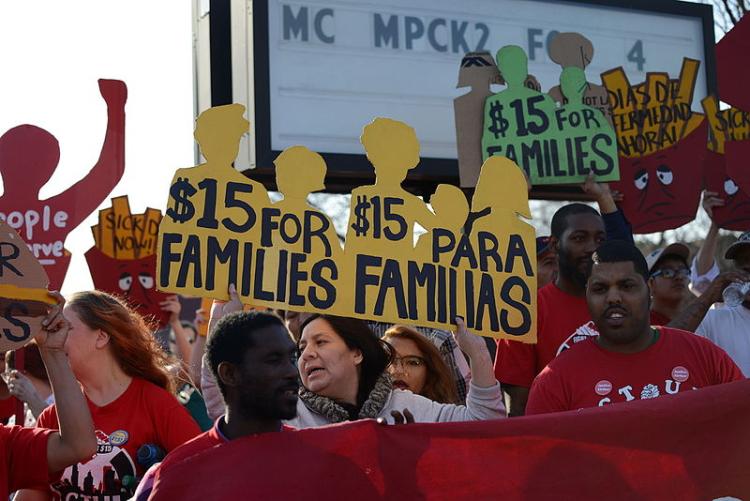Minimum-wage hikes could push low-pay workers away
Low-wage workers tend to commute away from states that raise the minimum wage rather than toward them, according to a surprising new CU Boulder study that suggests wage-hiking initiatives could have unintended consequences for some they aim to help.

Workers rally to call for a $15 minimum wage. Photo courtesy: Fibonacci Blue
“It found that low-skilled workers are actually migrating away from minimum-wage increases in their own states,” said study author Terra McKinnish, a professor in the department of economics. “That’s a sign that these increases could be having negative effects on their job opportunities.”
The study, published in the journal Regional Science and Urban Economics in May, comes as dozens of states are either considering or have passed minimum-wage increases.
In November, Coloradans voted to raise the minimum wage from $8.30 to $9.30 per hour effective Jan. 1, and the state will incrementally raise it to $12 by January 2020. Arizona, Maine and Washington voters passed similar measures. Some advocacy groups have been calling for a federal minimum wage increase to as much as $15 per hour.
McKinnish said that while such efforts are well-intentioned, some economists worry they could also have a “disemployment effect.”
“By making low-skilled workers more expensive, there is the potential for employers to use fewer workers, switch to slightly higher-skilled workers or exchange capital technology—such as self-serve kiosks—for low skilled workers.”
A previous study, published in 2014 by CU economist Brian Cadena, found that immigrant workers are less likely to move to states that raise their minimum wages.
But some recent news reports have suggested anecdotally that the disemployment effect is minimal and that low-skilled workers commute from lower-paying states like Idaho and New Mexico, to states like Washington and Colorado with higher minimum wages. McKinnish, a labor economist, set out to empirically test which scenario is more likely.
“I wanted to find out: If a state increases their minimum wage relative to a neighboring state, does that make workers more or less likely to commute out of state?”
She looked at census data for 93 labor markets in 23 states where low-skilled workers commonly cross state borders for work. She assessed out-of-state commuting rates for low-wage (under $10 an hour) workers and a control group of moderate-wage workers ($10 to $13 an hour) in 2005 to 2008. She found “no evidence” that low-wage workers commuted at higher rates to neighboring states with a higher minimum wage.
Then she examined the data for 2010 to 2011 after a federal minimum wage increase to $7.25 an hour prompted many states to boost their minimum wage and lessened the differences between neighboring states.
“If low-wage workers were previously attracted to commute across state lines in order to receive a higher minimum wage, we would expect the rise in their own state’s minimum wage, relative to that of the neighbor’s, to reduce the rate of out-of-state commuting,” she said.

CU labor economist Terra McKinnish
McKinnish found the opposite.
While moderate-wage workers were more inclined to stay in state, low-wage workers increasingly commuted out.
On average, a $1.50 increase in a state’s minimum wage corresponded to as much as a 50 percent increase in the number of low-wage workers commuting out.
Urban areas, where wages are already relatively high, might be less effected by such disemployment forces, McKinnish suspects, but rural areas could be hard hit. The larger the minimum-wage increase, the greater the impact, research suggests.
McKinnish hopes that as more states, municipalities and universities discuss living-wage initiatives, the research can help inform the discussion.
“This study is an argument to be more cautious and to thoughtfully weigh pros and cons,” she said. “If you raise the minimum wage, there are undoubtedly people whose wages will go up and who will benefit, but this and other papers suggest that there are also people who could be harmed, and those people will be the very lowest skilled people in the workforce. It is possible to legislate people out of a job.”


